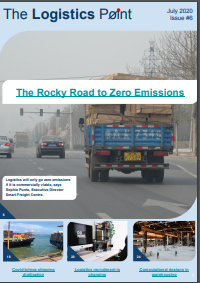As the gradual easing of restrictions under the COVID-19 outbreak begin, businesses that have been closed or running limited services during the shutdown period must now prepare their operations for the ‘new normal’; after all, some aspects of supply chains may never be the same after the crisis and it is important not to default to old processes.
READ: TheLogPoint Magazine July
As a consultant at FTA’s Supply Chain Consultancy (SCC) service, I have been advising companies on how they can best coordinate an effective, safe and efficient return to business. In this article, I will share some of the key points we believe businesses must consider to protect the safety, productivity and performance of their supply chain operations, if they are to optimise performance in a post-COVID-19 world.
While we should not be complacent, social distancing in the workplace is relatively easy to implement in a warehouse or office environment. Well-spaced workstations, staggered breaks, single owner handhelds and laptops, carefully considered walkways, in addition to plentiful cleaning points, will all be the norm for many months to come and are feasible for businesses of all sizes and natures to implement.
Of real concern are the health and habits of the workforce outside the workplace. It may be that some form of health monitoring, such as a temperature check, will be required at the start of each shift and any symptoms will lead to a week or two in isolation. While maintaining the safety of employees in work is achievable, we must remember that the virus may not have any obvious symptoms; as an employer, you must be vigilant at all times. And, until an effective vaccine is freely available, companies will need to continue business continuity planning for a reduced workforce.
So, under these new measures, how can businesses maintain high levels of performance and productivity? One solution is to extend the working day; if you operate a single or double shift system, then this may be the time to add that extra shift. It is unlikely that the same number of workers can operate effectively in and around your warehouse during peak times with social distancing in place, but sometimes individuals are more productive when they have fewer colleagues to socialise with at work.
And reduced congestion, less waiting for access, and fewer people queuing for a new task, handheld or piece of equipment may also lead to the improvement of an individual’s productivity. And this improved productivity, combined with additional working hours, may enable businesses to match and possibly exceed efficiency levels prior to the COVID-19 outbreak.
But of course, it is not that simple; extending the working day may mean that lead times need to be revised. Picking and packing into the night may make sense but if you miss the cut off time for dispatch your customers will not be happy.
Another likely reality of the ‘new normal’ will be the increased value consumers and businesses place on reliability. It is unlikely that the nation’s previous thirst for next day delivery will return; the national psyche has already adapted and prefers reliability of supply over speed of supply. Slightly longer lead times will be required to enable longer working hours but, if delivered well, consumers will be happy to accept the revised service offer.
Demand for reliable, high quality workplace PPE will have an impact on the short, medium and possibly longer-term view of the supply of many other goods.
Cheaper products from faraway places have become the norm with more and more businesses choosing to import products rather than manufacture locally. This will not change entirely as goods do need to be affordable, but we will need to adapt to maintain the reliability of supply. On-shoring or near-shoring of supply will become more prevalent. UK manufacturing has been in decline for many years so we are going to see a turn around here, possibly only a small change, but it will come, and we will see businesses that source locally being favoured over those that rely on global imports solely.
To assist logistics businesses of all sizes to return to work safely and effectively after the COVID-19 crisis, FTA’s Supply Chain Consultancy has launched a new, independent and strategic business review process, which aims to identify areas which fail to comply with new health and safety legislation and spot bottlenecks and weaknesses in supply chains.
If you recognise the challenges outlined in this article and would like some independent advice, please do not hesitate to contact the SCC team by calling 01892 552374. More information about the service is available here: https://fta.co.uk/services/operational-consultancy
